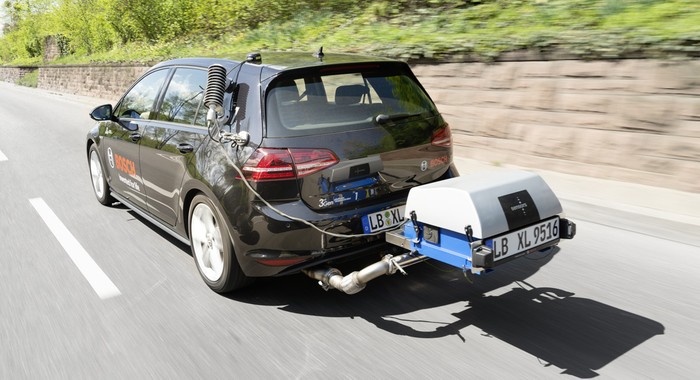
Bosch claims 'breakthrough' eliminates diesel emissions problem
\"Soon, emissions will no longer be an issue,\" promises CEO Volkmar Denner.
As some automakers shift away from diesel in the wake of Volkswagen's emissions scandal, Bosch claims to have achieved a 'breakthrough' that reduces exhaust pollutants by an order of magnitude.
"Today, we want to put a stop, once and for all, to the debate about the demise of diesel technology," says CEO Volkmar Denner.
The supplier claims its prototype cars are emitting "as little as" 13 milligrams of nitrogen oxides per kilometer in standards-compliant real driving emissions (RDE) testing, representing a fraction of the 120-milligram legal limit that will be rolled out in 2020. In "particularly challenging urban conditions" the average emissions are "as low as" 40 milligrams per kilometer.
The unprecedented achievement allegedly required just a few months of development using existing technology. Engineers are said to have combined advanced fuel-injection, a newly developed air management system and intelligent temperature management.
"NOx emissions can now remain below the legally permitted level in all driving situations, irrespective of whether the vehicle is driven dynamically or slowly, in freezing conditions or in summer temperatures, on the freeway or in congested city traffic," the company promises.
Existing diesel vehicles are said to experience significant increases in NOx output when drivers are more aggressive on the throttle, or when idling in traffic and the exhaust gases are below 200 degrees Celsius. The new solution centers around an RDE-optimized turbocharger that reacts more quickly to better control boost pressure across the power band, while an advanced thermal management system ensures the exhaust-gas temperature stays hot enough in all conditions.
The company says the breakthrough does not require any additional hardware components beyond the parts already employed in production vehicles, and will not make diesel vehicles any less affordable.
The bold claims will undoubtedly be met with skepticism until third-party labs can verify the results and automakers have a chance to review the cost proposition and other factors, such as diesel exhaust fluid consumption and long-term durability of the emissions control systems.